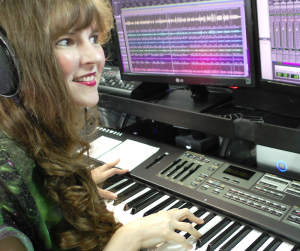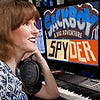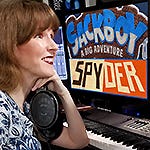
Featured Blog | This community-written post highlights the best of what the game industry has to offer. Read more like it on the Game Developer Blogs or learn how to Submit Your Own Blog Post
The North American Conference on Video Game Music: Q&A with Keynote Speaker Winifred Phillips
An excerpt from the live Q&A session held on Jan. 18, 2015 during the North American Conference on Video Game Music. Topics include game music production, career building, live performance and issues related to game music study.

(The transcript that follows is an excerpt from the live Q&A session moderated by Professor Martin Blessinger and sponsored by the TCU Society of Composers, held on January 18, 2015 during the North American Conference on Video Game Music in Fort Worth, Texas. The conference was organized by TCU professor William Gibbons. Winifred Phillips is an award-winning game composer (Assassin’s Creed Liberation, LittleBigPlanet 3, God of War, and more) and the author of the book A Composer’s Guide to Game Music, published by the MIT Press.)

Audience Question: When you actually have to go out and hire a choir, hire an orchestra, what happens, do you just get the local LA Phil, or is there an audition process? What are the avenues that you go through?
Winifred Phillips: For the projects that I’ve been involved with that have done that, the developers and publishers themselves have had their own relationships with instrumentalists, with contractors, and they have taken care of that kind of hiring. So, thankfully, they have known a lot of talented and interesting people, and I’ve had a great time working with those resources… but I wouldn’t say it’s a large part of what I’ve done in video game composing. Brian Schmidt is the president of the Game Audio Network Guild – he recently conducted a very interesting and comprehensive survey about procedures for composers and audio folks, and he found that far less live recording than we had thought. Most of us are still one-stop shops – one-man, one-woman bands. That’s one of the most important skills that we can cultivate in ourselves as game composers, especially now with the video game environment diversifying. There are all sorts of smaller projects going on, and smaller teams, and lots of people splintering off and forming new projects and new initiatives. So you really need to be able to jump in there and say, “I can do it all for you.” And that’s something that I’ve concentrated on.
I think that orchestral simulation as a skill is something that should be taken as seriously as possible, because it does require serious musicianship and understanding of what it means to be a musician in various instruments, how various instruments are performed, and a sensitivity to how they should sound. It’s a skill we all need. Even if we fully intend to hire live musicians later on, we are going to be required to deliver orchestral simulation for the early listening and review of these tracks. So I think that’s a very valuable and important skill and I have such respect for the artists who can do it beautifully.

Pictured: Composer Winifred Phillips and Session Moderator Martin Blessinger
Audience Question: So you’re talking about orchestral simulation, and it’s something that I’m looking down the road at – as a place I would like to be. But as you know, there’s very often a perceived or very real financial barrier between being able to do that. Like right now it seems that I’m two thousand dollars shy of being able to do what I’d like to do… which I think is everyone’s case for everything always. (Audience laughter) But that being said, and I guess if you want, you could also… say… listen to electronic synthesis, like you did in your Speed Racer game score, which seemed a departure from your standard style. But – how do you start in terms of orchestral simulation, you know? Where is the jump from the really crappy built-in Logic MIDI ones? What’s step two but not quite step two thousand dollars? (Audience laughter)
Winifred Phillips: That is a really great question! How do we maximize the ability of the tools we have? Because the orchestral simulation at its height is such a financial hardship, how do we create worthwhile music on more of a budget? I can tell you what my experience was. When I did God of War, my studio was nowhere near what it is now. That was quite a number of years ago – that was 2004. And so for me, everything that I was focused on at that time was about maximizing the tools I had. I think this is true of all composers in all times in history. As new instruments are created, and they have new capabilities, composers of the time change the way they write based on the instruments they have. Not saying that the way they would write before was not worthwhile, because of course it was. There’s marvelous music from those periods. But, they were writing for the tools they had, and we realize this. And then as instruments are refined, as their capabilities are broadened, new music is created that takes advantage of it, and that’s fantastic!
I think what we have to do when we are looking at a sonic palette that is limited… is maximize the muscle that we’ve got. That’s what I did with the God of War project, and with Charlie and the Chocolate Factory, which was at approximately the same time. So I was looking for ways to make what my sound palette could do as expressive as I possibly could. So you essentially end up in a process of trial and error and experimentation… much in the way you play a video game. If it doesn’t work, you restart the level. So, that’s what I did in composing when my studio was not as muscular as it is now. And that’s the way you can create music that is still going to be strong.
I thought this was interesting too… that when my tools were more limited, it really did force me to be very focused on the basic structure of what makes music listenable… what makes it compelling… and what can draw you forward through the experience you’re supposed to be supporting throughout the video game. So that’s what I focused on, and that’s what you can be focusing on as you continue to refine your studio. It takes time, obviously. A budget isn’t going to suddenly explode unless you win the lottery. (Audience laughter) So you’re going to build it over time, then you’ll be using it in different ways, and your music will change. Your style will change. I know my style has changed, but I still retain the experiences I had at the beginning and I think they were instructive. The idea of working within a restricted palette and still being able to do something that felt musically worthwhile to me – that, I think, was a good education. It’s a good way to grow as a composer, I think.

Audience Question: Knowing what you know now, after getting all this experience under your belt, if you were a composer who was wanting to get into video games, what other conferences would you go to, and how would you approach game developers – not having any titles yet?
Winifred Phillips: It is a different environment, the game industry, from the one in which I got my first gig, so I don’t know if my personal experience would be helpful to you… but I can tell you some of the things that I’ve seen that seem to be a good way to start at least. Research, I think, is one of the best ways to begin gathering information that’s going to help you to locate those development teams and publishers that are looking for fresh talent. It’s important to get abreast of what is happening, what new teams may be forming, what sort of personnel changes are happening at development companies, so that you can get a sense of who might be open to hiring at any particular time. The thing that’s hard about getting jobs as composers is – they don’t advertise these gigs. It’s not like being in any other part of the game development industry, where they put out help wanted ads everywhere. For us, these jobs are hidden, and our timing has to be excellent. So we have to continually research.
I like Gamasutra, I like GamesIndustry.biz, I’m constantly looking at a lot of different sites. Press releases can be very helpful. You’re looking for hints, basically. You’re looking for a sense of who might be starting up something new. So in terms of conferences… Game Developers Conference in San Francisco is a very good conference to go to. It’s very educational. The audio track is extraordinary. It’s incredibly vibrant. There’s a marvelous contingent of the audio development community there, so you’re going to… at least… get a sense of involvement and participation in the energy and enthusiasm and creativity that’s firing the game development community and the audio folks in particular. That can keep you going, looking for jobs, even if going to the conference didn’t yield any gig leads. At least, it got your enthusiasm fired up so that you can keep pounding that pavement on your own. And that’s important because it is a long haul. It can take a long time to surface these opportunities, and when you’re first starting you’re not used to the idea of the long view… which you have to take as a composer. You’re thinking about the long view all the time… about making relationships happen with people who may not hire you for years, but may eventually do so. You keep the long view, and you keep it in your mind that it may take awhile for the opportunities to surface, then I think you can’t help but do well in the long run – if you stick with it. I think the biggest obstacle is frustration, is dropping out of it because it’s hard. But if you can push that away and keep trudging that path, that’s where success comes from, I think.
Audience Question: When you’ve been a part of these teams such as the God of War team, have you done or are you doing a lot of collaborations with other composers, or mainly individual projects?
Winifred Phillips: Now for God of War and for the LittleBigPlanet series, these are the two teams that I‘ve worked with. They tend to hire us based on our strengths, what we do best, and they bring together a team full of composers that each have a particular quality that adds a dimension to the project. So we all sort of fit together like puzzle pieces, but we’re working on our own, we’re creating individual tracks. We’re not collaborating for the most part – at least, that’s been my experience, when I’ve worked in teams. Then, the music is brought together by the audio team, music implementation folks, audio director… and they look at it, and assemble it in a way that feels like a unified project. Really, I find it amazing that the audio directors and the music teams on these games can give us the kind of direction necessary to make the final product feel unified, to feel like a single vision. It’s quite extraordinary, because we are all very different, and being able to bring us all together, to create a final musical score that feels like a single expression that fits within the game is really an accomplishment. It’s something I really admire.
Audience Question: A common obstacle for scholars interested in video game music is access to reliable and accurate scores, not just of arrangements of music, but of the actual tracks used in the actual game environment. This is a problem for research, but also for pedagogy, because it is often very helpful, not just to have the sound files, but real scores for students to work with. I’m wondering if on the one hand if you have any recommendations for short term solutions to these problems, but also, since you’re on the industry side of things, if you have any recommendations or any ideas about long term structural changes that can be made to remedy this issue for the future?
Winifred Phillips: Hmm, that’s an interesting question. You know, I think it has a lot to do with the viability of game music outside of the venue for which it was originally created – the video game. I think this is something that is changing now, but for early video games, and for much of the life of video game music, it existed within the game, and it did not exist anywhere else. There were very few soundtracks released, and there was not much happening in terms of video game music being performed by ensembles, so what reason would there be for printed musical scores to exist that performers could play or that other composers could study? There was no practical purpose for it, and that’s changing now as ensembles are popping up that are performing video game music. Of course, Video Games Live is the example that comes to mind immediately for me. And that’s really great, because it brings game music to wider audiences. So, I think it’s good that we’re seeing more of that kind of touring performance. I think it’s illuminating for the audience and it’s very supportive for composers and musicians who are interested in this kind of music.
In terms of getting more of this out there so that the realm of musicologists can study it… that really depends on the viability of a market that can support it. So, I think it’s still going to be a problem for awhile. The kinds of music that will be available for examination will be those triple-A high budget projects that had orchestras involved in the music for the games themselves, or those projects that have such fan love and adoration that arrangements have been created for touring performances. I think that’s where you’re going to be seeing most of the material that you’ll be able to look at right now. And I hope it does change, and that there is the opportunity for more of these scores to be made available. If more performance groups were interested in performing our music, we might have a more financially viable means to take the time to create these printed scores.
 Winifred Phillips is an award-winning video game music composer whose most recent project is the triple-A first person shooter Homefront: The Revolution. Her other credits include five of the most famous and popular franchises in video gaming: Assassin’s Creed, LittleBigPlanet, Total War, God of War, and The Sims. She is the author of the award-winning bestseller A COMPOSER'S GUIDE TO GAME MUSIC, published by the Massachusetts Institute of Technology Press. As a VR game music expert, she writes frequently on the future of music in virtual reality video games. Follow her on Twitter @winphillips.
Winifred Phillips is an award-winning video game music composer whose most recent project is the triple-A first person shooter Homefront: The Revolution. Her other credits include five of the most famous and popular franchises in video gaming: Assassin’s Creed, LittleBigPlanet, Total War, God of War, and The Sims. She is the author of the award-winning bestseller A COMPOSER'S GUIDE TO GAME MUSIC, published by the Massachusetts Institute of Technology Press. As a VR game music expert, she writes frequently on the future of music in virtual reality video games. Follow her on Twitter @winphillips.
Read more about:
Featured BlogsAbout the Author(s)
You May Also Like







.jpeg?width=700&auto=webp&quality=80&disable=upscale)








